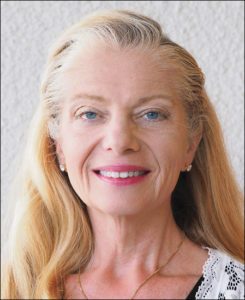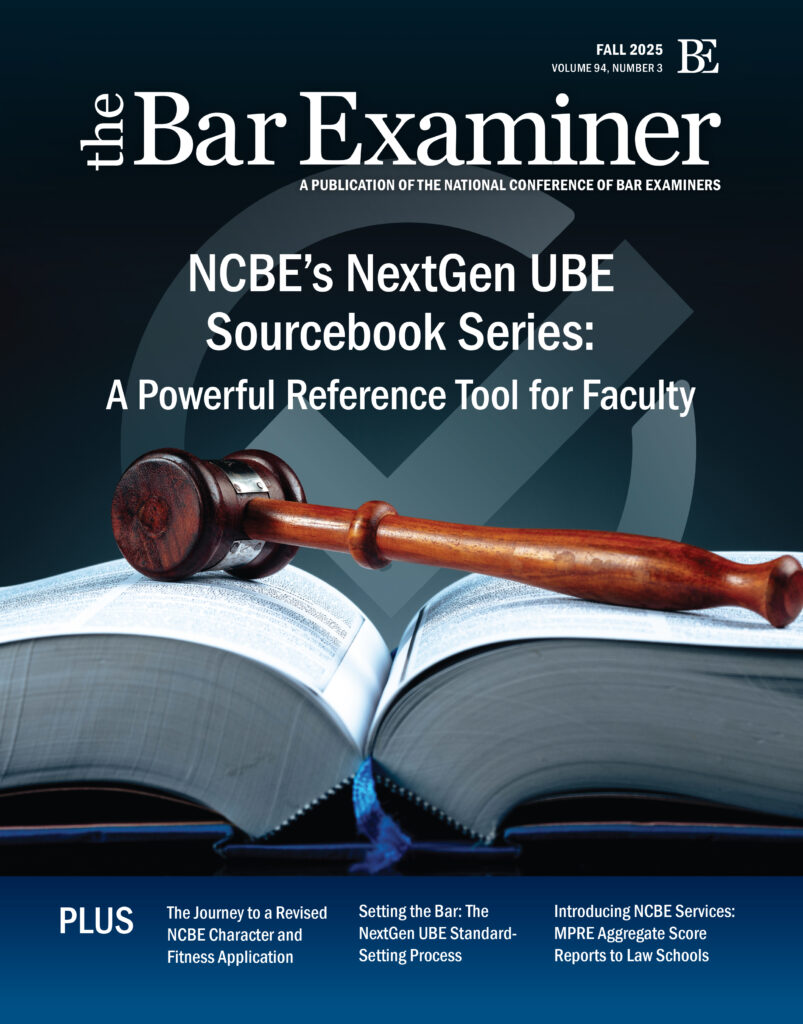This article originally appeared in The Bar Examiner print edition, Fall 2019 (Vol. 88, No. 3), pp 1–3.
By Hon. Cynthia L. Martin

On Being Integrated
integrated: combining or coordinating separate elements so as to provide a harmonious, interrelated whole; organized or structured so that constituent units function cooperatively.
(Webster’s Third New International Dictionary, Merriam-Webster, 1993)
I remember a song performed by my middle school choir. It was a Joan Baez tune, intended, no doubt, to inspire aspirational thinking. It went like this: “No man is an island / No man stands alone / Each man’s joy is joy to me / Each man’s grief is my own / We need one another / So I will defend / Each man as my brother / Each man as my friend.” (Joan Baez, “No Man Is an Island”)
It is safe to assume that Ms. Baez was not contemplating attorney licensure when she recorded this ballad in 1968. However, her words are relevant to the complex ecosystem of those involved in preparing newly licensed lawyers for the practice of law. The constituent members of that ecosystem—the Law School Admission Council (LSAC), the legal academy, NCBE, bar admitting authorities, state bar associations, state judiciaries, and legal employers, to name a few—share common objectives. We are each motivated to ensure that newly licensed lawyers are minimally competent in the knowledge, skills, abilities, and ethical responsibilities required to serve the public in a manner that upholds the rule of law and fosters our system of justice. Key to the success of our ecosystem is recognition that each constituent member plays a unique and essential role in pursuit of our shared objectives. No one of us can attain the objectives alone. No one of us is an island.
These are trying times. In recent years, a perfect storm of stressors have coalesced to challenge what had been the relative calm of our ecosystem, to the material disadvantage of the law students/future lawyers we are supposed to be preparing. Declining applications for law school, falling bar pass rates, reduced credentials for admitted first-year law school classes, and reduction of available JD-required employment opportunities collided with increased ease of borrowing, mounting student loan debt, rising tuition, access to justice concerns, accreditation challenges, and increased reliance on published rankings to yield an explosion—the shrapnel from which continues to fall. We were all caught flat-footed. As the security of “the way things had always been” was challenged, we forgot to pull together to address the challenges. We forgot that we have shared objectives and a shared obligation to protect the student consumers of our services. We reacted by attempting to find fault with and pin blame on one another. We became islands, with big fingers to point.
Every newly licensed lawyer must traverse the lanes we each represent in our ecosystem. Our respective lanes cannot function effectively as a path to the profession without collaboration, shared respect, shared vision, open-mindedness, and cooperation.
It would serve us well to step back. It would serve us well to respect and support one another. It would serve us well to acknowledge the strengths we each bring to the table. It would serve us well to stop deflecting and to start reflecting. Every newly licensed lawyer must traverse the lanes we each represent in our ecosystem. Our respective lanes cannot function effectively as a path to the profession without collaboration, shared respect, shared vision, open-mindedness, and cooperation. If one lane needs a little roadwork, the others must be willing to temporarily absorb the additional load, without viewing it as an opportunity to permanently divert traffic.
NCBE accepts its share of the responsibility for contributing to an island mindset. But that mindset is behind us. We have made a concerted and intentional decision to focus our energies, resources, and attention on building bridges between the islands in our ecosystem. Let me give you just a few examples.
The Testing Task Force, which began its work in January 2018, is undertaking a comprehensive and unencumbered three-year research project to determine the critical competencies newly licensed lawyers should be expected to have, and to design a bar exam of the future accordingly. Although the Task Force fully anticipates that its research will reveal critical competencies that are not suitable for testing on a bar examination, our thought process, naïve and wide-eyed as it may seem, is genuine and sincere. Why wouldn’t we—in fact, why shouldn’t we—undertake unencumbered research mindful of the opportunity it would afford to share information with the constituent members of our ecosystem? Why wouldn’t we design a research plan with an expectation that the bar exam of the future should be designed respectful of the unique role each member of our ecosystem plays in producing minimally competent newly licensed lawyers? Why wouldn’t we include as a critical component of our research plan meaningful opportunities for stakeholders’ voices to be heard? As the chair of the Testing Task Force, I can assure you that these “laudable” goals are not lip service. The Testing Task Force is 100% committed to an undertaking that is driven by a simple foundational principle: we are all in this together, striving to the same end. We need one another.
There are other examples.
- NCBE is proactively enhancing and refreshing the products, educational programming, and services it provides to jurisdictions, each of which administers a state-specific framework for bar admission under increasingly challenging circumstances.
- In early 2019, NCBE cosponsored with LSAC a measurement conference for members of the legal academy. We expect that successful conference to be repeated in 2020.
- NCBE’s president, Judy Gundersen, has actively pursued opportunities over the last two years to meet, and share information and ideas, with LSAC, the Institute for the Advancement of the American Legal System (IAALS), leaders in the legal academy, AccessLex, the National Association for Law Placement (NALP), the ABA Section of Legal Education and Admissions to the Bar, and members of state commissions charged with studying the bar exam.
- NCBE worked cooperatively with the ABA’s Commission on the Future of Legal Education, notwithstanding its open challenge to the existing framework of the bar exam.
- NCBE began a partnership with the Council on Legal Education Opportunity (CLEO) in late 2018, providing financial support to remarkable pipeline and bar preparation programs that serve historically disadvantaged law students.
- NCBE is working cooperatively with the California State Bar working group studying the California bar examination.
- NCBE recently committed resources toward revamping its bar preparation materials through the development of BarNow, an affordable, interactive eLearning platform.
- NCBE is also exploring opportunities to collaborate with AccessLex to cosponsor a conference for academic support educators.
These are but a few examples of NCBE’s purposeful focus on opportunities for mutual enrichment, collaborative growth, and shared vision with the constituents in our ecosystem. We remain quite proud of the services and test products NCBE offers. But we are cognizant of the fact that we can always learn more and do better.
Perhaps it is taking a moment (maybe two) for the sincerity and genuineness of NCBE’s bridge-building efforts to resonate with some. That’s okay. We did not start down the bridge-building path because we were looking for pats on the back. We did so because it is the appropriate path to travel. Because no man is an island.
NCBE will continue to explore opportunities to be a part of an integrated ecosystem—constituent units that function cooperatively to produce a harmonious, interrelated whole. Do you have ideas for linking arms as we strive toward our shared objectives and obligations? We want to hear them.
Sincerely,
![]()
Hon. Cynthia L. Martin
Contact us to request a pdf file of the original article as it appeared in the print edition.







